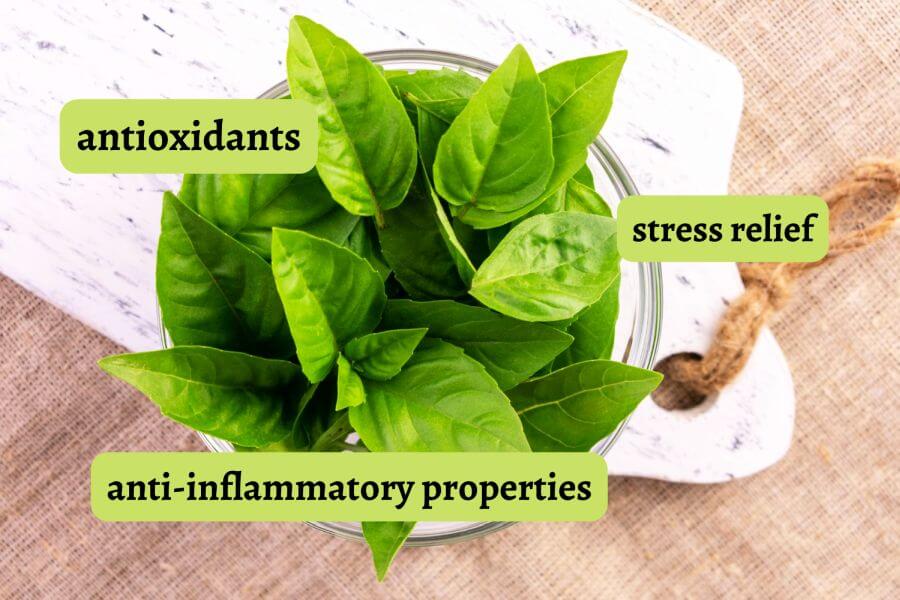Key Takeaways
- Basil itself is not toxic to dogs ✔️
- Other ingredients often used in conjunction with it, such as onions and garlic, can be dangerous ⚠️
- Health conscious dog owners should look to basil as a beneficial addition to their pup’s diet, but always check with the vet first.
- Start with a small amount to see how your dog reacts before giving them more ✔️
Basil has been used to bring out the flavor in Italian cuisine for centuries. From classic pizzas and spaghetti dishes, to zesty tomato sauces or hearty pestos – this herb does far more than just tantalize taste buds; its essential oils create a nose-pleasing bouquet of eugenol, caryophyllene and linalool aromas that pack anti-inflammatory, antibiotic and antioxidant benefits too! So can dogs eat basil?
Health Benefits of Basil for Dogs
There are some herbs that can be safely consumed by dogs. But can dogs eat basil? Before we answer that question, let’s look at the properties of this particular herb.
- Eugenol is responsible for the spicy, clove-like flavor of basil. It can potentially reduce free radicals.
- Caryophyllene can help with inflammatory conditions such as arthritis.
- Linalool is known for its stress-relieving properties.
- Humulene can potentially reduce inflammation.
Is your pup feeling a bit left out in the kitchen? Don’t worry, they can join you at dinnertime with fresh basil! This fantastic herb not only adds an awesome flavor to meals but also provides many health benefits. So why deny them from tasting its deliciousness and getting all these advantages too? Give into temptation and let Fido indulge!

Basil helps with canker sores, protection against osteoarthritis and cancer, and healing of cuts and wounds. It can also reduce pain in the gums, can be used as mosquito repellent, and dispel flatulence. It can even lower blood sugar levels in diabetic dogs.
Can Dogs Eat Basil in Dishes?
Usually, basil is an addition to other meals, which can contain ingredients that are dangerous for dogs. Basil itself shouldn’t be harmful for dogs, but is often used in conjunction with onions and garlic, which are toxic to dogs. For example, pesto is mostly made with basil, but recipes also call for a few cloves of garlic.
Symptoms of garlic toxicity in dogs include diarrhea, vomiting, stomach pain, and anemia. Always make sure that all the ingredients are safe for dogs before you give your pup any human food.
How Much Basil Can Dogs Eat?
To use basil as a spice in your dog’s food, you shouldn’t give them more than 1/2 teaspoon per 10 pounds of body weight once or twice daily. A moderate amount of basil leaves or dried basil are a perfect addition to a dog’s meal. Dogs can eat basil and the list of its health benefits is long.

Editor’s Note
Although most dogs enjoy the flavor of herbs and spices, some can be sensitive to certain types – like basil. An allergic reaction may cause redness or discomfort on your pup’s skin and a larger amount could result in vomiting. If you’re considering adding this culinary herb into their dinner rotation, keep an eye out for any symptoms after trying it just once – that way if there’s no sign of distress from Fido then they’ll safely benefit from all its nutritional goodness!
Do Dogs Like Basil?
For many dogs, basil is a delicious treat – its smell and taste providing an aromatic feast for their senses. However, if you’re adding it to your pup’s food bowl make sure that you try a bit first; not all doggos are fans of this herb so always test before treating too much!
How to Feed Basil to Dogs
Keep your pup healthy with a flavorful boost; add some basil to their diet! Fresh leaves in food and water make for an aromatic treat, not only providing great taste but also helping fight off infections. Dried or sprinkled over meals will help too – it’s a win-win situation that can have huge benefits for your furry friend.
What Other Herbs and Spices Are Good for Dogs?
Oregano, cilantro, mint, rosemary, and thyme all have great health benefits for your pup when used in moderation. Cilantro can help fight pesky bad breath while also providing an extra nutritional kick – rosemary is known to reduce inflammation as well as add flavor – plus thyme has powerful antibacterial properties that any canine will appreciate.
Always consult with your veterinarian before adding any herbs or spices to your dog’s diet. A small amount of basil leaves in a meal is generally safe for dogs, but listen to the reaction of your dog to determine if there are any negative side effects.
Summary: Basil Is Not Toxic to Dogs
In a nutshell, can dogs eat basil? While this herb can offer some health benefits, one must be careful as different breeds and ages of dogs may require specifically tailored diets depending on their individual needs. Additionally, herbs have been known to interact with various medications in pooches so caution should always be taken before introducing something new into Fido’s diet.
Similar Posts:
- Can Dogs Eat Rosemary | Dogs and Herbs
- Can Dogs Eat Cilantro? Coriander, Cilantro & Dogs
- Can Dogs Eat Parsley? How Can This Herb Be Bad for Dogs?
- Can Dogs Eat Mustard?
- Can Dogs Eat Jalapenos? Are Peppers Bad for Dogs?
- Can Dogs Eat Pickles? The Pros and Cons of Letting Your Dog Eat Pickles
- Can Dogs Eat Garlic Bread? Is Garlic Safe for Dogs?
- Can Dogs Eat Pomegranate? Pros and Cons of Pomegranate Seeds in a Dog’s Diet

